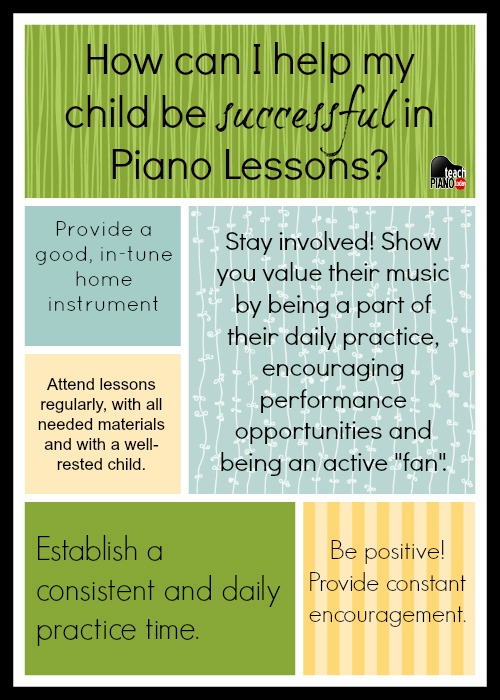Enjoy this very informative article from one of my favorite resources - www.teachpianotoday.com
Piano Lessons? A Share-able for your Piano Studio…
But if you haven’t been asked this
question, and you’d really like your piano parents to know the answer,
then we have the perfect list and attractive share-able for your piano
studio website, Facebook page or blog (see below). Tweet it out, share
it, shout it from the rooftops! To use the image, right click and “save
as” to your computer.
This is How You Can Help Your Child Be Successful in Piano Lessons!
1. Provide a good in-tune home instrument – We’ve blogged about this before, but having a decent instrument at home
is paramount to the success of your piano kid’s lessons. Without a way
to properly practice at home, your child will feel inadequate come
lesson time and will rapidly lose motivation and interest.
2. Attend lessons regularly with all needed materials and a well-rested child –
Regular attendance ensures that your child progresses. Progression
leads to feelings of self-confidence and achievement. Piano students
need their books at every lesson as well as any other materials
suggested by their teacher. Keep books organized at home and teach your
child learn to be responsible for their materials.
Children learn best when they are
well-rested (not only in terms of sleep, but also in terms of
“extracurricular over-load”) and when they are healthy. Sick piano kids
don’t retain very much… and result in sick piano teachers!
3. Establish a consistent and daily practice routine –
Piano lessons are one of the few extracurricular activities that
require daily attention. Choose a specific time of day that works for
your family (before school, after dinner, after the bath etc.) and make
piano practice a regular and consistent event every single day. Avoid
times that are hectic or rushed, remove distractions (like the TV or
smaller siblings) and try to be in the vicinity to offer encouragement
and/or help with piano practice.
4. Be Positive… provide constant encouragement –
Comment often on your child’s progress. Remember the names of the
pieces they are working on and make requests as you go about your day to
encourage regular visits to the piano. Show your pride by sharing
videos, photos or musical phone calls with friends and family. Help
your child to identify themselves as a “pianist”.
5. Stay involved! Show
that you value music by providing live-music opportunities, encouraging
your child’s participation in recitals and performances and being a
part of their daily practice in some way (even if it’s only as a happy
listener). Seek out opportunities to involve music in your daily
routines (some great ideas here!)
By being an active member of the “Piano
Teaching Triangle of Success” you ensure that your child gets full
advantage of the many, many benefits of piano lessons.
One fabulous way for parents to be involved in consistent piano practice is through the 88 fun practice activities found in “Shhh…Your Piano Teacher Thinks This is Practice”.
Even parents with no musical background can have fun sharing these
activities with their child that are sure to result in lots of laughs
and lots of learning!


No comments:
Post a Comment
I would love to hear your musings about these posts!